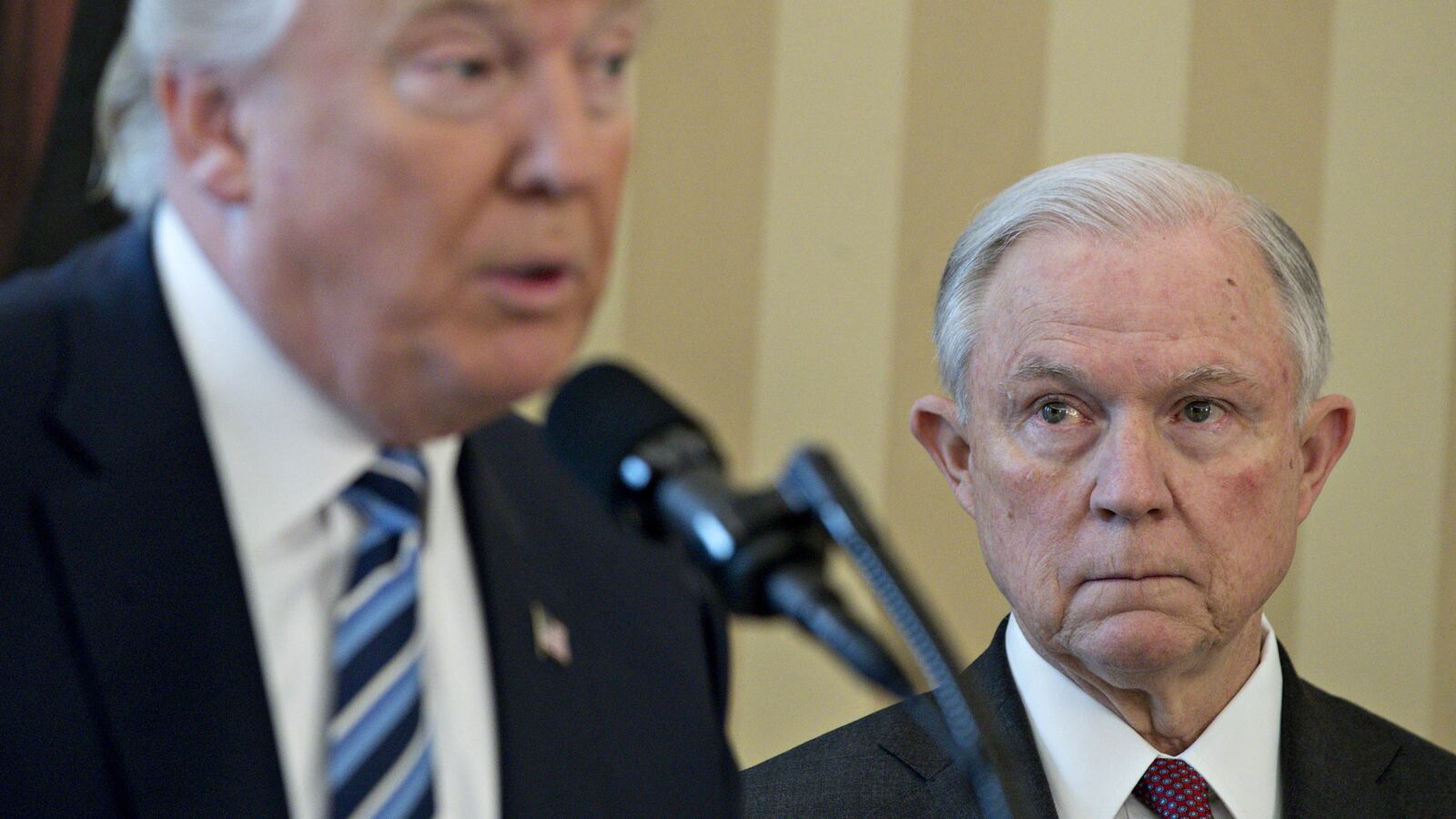If you need proof that Donald Trump’s tenure will leave Republicans worse off—collectively and individually—than when they found him, please allow me to introduce you to Jeff Sessions, whose political career came to an abrupt close Tuesday night.
Six years ago, Sessions was a powerful U.S. senator. He had run unopposed for his fourth Senate term, and Jesus Christ might have had a hard time defeating him in Alabama. Yesterday, Sessions found himself handily rejected by his fellow Alabama Republicans in a political riches-to-rags story that it’s hard to see as anything but a tragedy.
Trump might never have become the Republican nominee, much less president, were it not for Sessions, who was the stunt candidate’s first Senate endorsement in February 2016. Among other things, Sessions’ support eviscerated the claims of Trump’s then-rival Ted Cruz (who had spent months sucking up to Sessions) that Trump wasn’t really a conservative.
Once ensconced in his dream job as Trump’s attorney general, Sessions was almost immediately forced to choose between doing the right thing or demonstrating complete loyalty to Trump (aka, being his “Roy Cohn”). As Tim Alberta writes in American Carnage, Trump is “someone who values professional utility over personal relationships in the people he deals with, someone who shows regret for nothing he says or does, and someone who prizes loyalty above every other characteristic.”
By choosing to retain a sliver of honor, and appropriately recusing himself from the Russia investigation, Sessions demonstrated insufficient loyalty to Trump.
The rest is history. After enduring almost endless humiliation (Trump has reportedly referred to Sessions as “weak,” “slime,” “not mentally qualified,” a “dumb southerner,” and “Mr. Magoo”), Sessions was unceremoniously fired.
Sessions tried to win back his old Senate seat (and the president’s affection), but Trump wasn’t satiated. Sessions is all in on Trump’s agenda, but he put the law above personal loyalty and as he’s run for the Senate seat he left to join the administration, Trump has ripped him as “a disaster who has let us all done” while endorsing former college football coach Tommy Tuberville. While Sessions had to resort to the old bit about how Alabamans weren’t going to take instructions from Washington, Trump told Alabamians that Coach Tubbs is “going to have a cold, direct line into my office. That I can tell you."
Used and abused, Sessions is the latest reminder of what Trump has done to Republicans writ large. Trump used them to gain power, forced them to capitulate or be cast out, toyed with them for years, gave them a tiny bit of hope—only to conclude by ruthlessly slitting their throats.
It’s not a perfect analogy, of course. Few elected Republicans embraced the nativistic side of Trumpism with Sessions’ zeal (in this regard, he was a true believer, while most other Republican politicians were simply cowards or opportunists) nor did they (inadvertently) inflict so much damage on Trump’s presidency.
Still, if Republicans lose the White House and the Senate in November (an increasingly likely scenario), Sessions’ fate won’t have repeated itself, exactly, but it just might rhyme as the minions who enabled Trump’s rise are inevitably forced into a lose-lose choice between their dignity and their loyalty. Most have decided to maintain their powerful jobs at the expense of their decency, and many have and will end up losing both.
Once you sign the Faustian bargain with Trump, your fate is sealed. You are, at that point, damned if you do and damned if you don’t. All that’s left are the details. Standing up to Trump never ends well because you are usually standing alone. But standing down looks even worse. Nobody gets out unscathed.
In the vain pursuit of his old job, Sessions released what many called a “hostage tape,” praising Trump. It only succeeded at making him look weak and reminding history that he is, in fact, complicit in this disastrous presidency and a cautionary tale for Republicans—proof that nothing short of absolute loyalty will ever be sufficient for a Trumpist party.
Consider the immediate implications. If you are Martha McSally, Cory Gardner, Susan Collins, or Thom Tillis, you might ask yourself whether surviving this election is worth the reward of having to remain personally loyal to Trump at all times. After all, these candidates’ fates are tied to Trump’s. If he loses, they probably lose. If he wins, they might, too.
Sessions was the opening act of Trump’s reign of terror. Sessions believed in Trumpist philosophy, committed just one transgression (under the assumption that he was merely following norms), and Trump punished him like a mob boss.
If Trump does this to his friends, what fate awaits his tepid Republican supporters?







